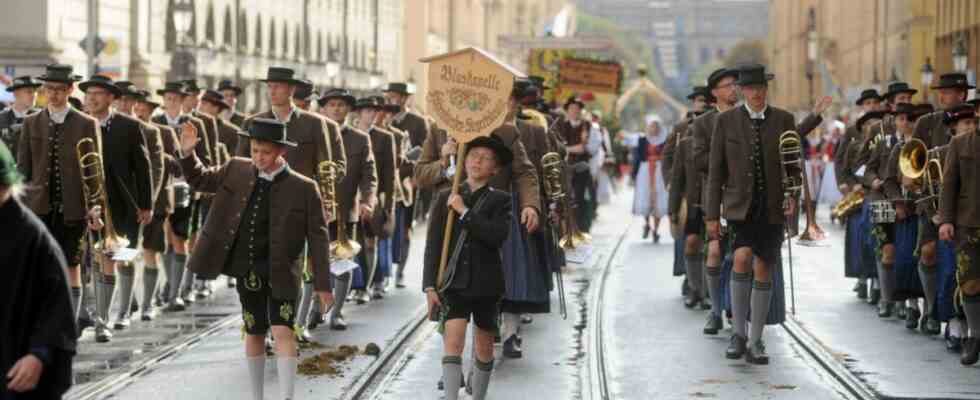marching band? Even one of the largest in Upper Bavaria? From the point of view of the zeitgeist, that doesn’t sound so sexy at first. Sure, such a Bavarian parade is something to behold, it’s a general attack on the senses: the rhythmically stimulating sound and people marching decoratively in dirndls and lederhosen. The members of the brass band Höhenkirchen-Siegertsbrunn, who regularly parade in the traditional costume and riflemen’s parade at the beginning of the Oktoberfest, certainly also make Bella Figura. For observers who are less inclined to tradition and committed to high musical culture, the sight of trumpets, tubas and traditional costumes embodies the cliché of Bavarianism that has become manifest.
“Brass band? A picture quickly emerges,” says Florian Sepp. “Umtata,” says Walter Moldan, who is sitting next to him. Of course, the two chairmen of the Höhenkirchen-Siegertsbrunn brass band have nothing against alpine rifle marches or polkas, or light music in general. On the contrary. “The traditional is part of it for us,” says Sepp. Nevertheless: “The name ‘brass band’ only stands for an excerpt of what we do.”
In fact, the institution founded in 1980, which was shaped by Florian Sepp’s father Erich Sepp in the first two decades, is characterized by a musically diverse concept that is also implemented at a high level of performance. This includes concertante symphonic music from all eras as well as film music, waltzes, swing, marches and sacred music. There are four orchestras conducted by three professional conductors: in addition to Florian’s brother Konrad Sepp, who is the overall musical director, Bernhard Willer, who conducts the symphonic wind orchestra, and Sonja Weese, who conducts the large wind orchestra. In addition, there is the youth wind orchestra, chamber music formations or special formations such as the percussion ensemble.
“Therefore, there are already considerations as to whether we should rename ourselves,” says Florian Sepp. “But that is of course a sensitive issue, especially since the name is part of our brand core.” The brass band is an association, there are more than 200 active musicians, plus almost 80 children in early musical education, and around 480 supporting members. So “Musikverein” would be a nominal alternative.
Irrespective of such considerations, the brass band has gained a musical reputation, above all through a surge in professionalism since the turn of the millennium, and is also valued for its work with young people. This has already been recognized with the Bavarian State Prize for Music in 2015 and the Culture Prize of the Munich district, which was awarded for the first time in 2021. What is unusual, says Sepp, is that you have two large adult orchestras.
The two chairmen Florian Sepp (left) and Walter Moldan in the current rehearsal room in the Höhenkirchner Sigoho-Marchwart elementary school.
(Photo: Claus Schunk)
The brass band gives about 100 to 150 concerts a year, the highlights include the almost always sold-out spring or New Year’s concerts in the Höhenkirchen multi-purpose hall. But they also perform nationally, and concert tours have taken the musicians from the south-east of Munich to Spain, Italy and Romania. In addition, special projects such as the performance of Dvořák’s 9th Symphony (“From the New World”) in an arrangement for wind instruments will be realized. Many musicians come from the community, but also from surrounding communities or from the eastern outskirts of Munich. The generations play together in the orchestras, the oldest musician is currently 88. “And what’s great: the club is very young. Around half of the members are under 20,” explains Moldan. The second chairman plays the saxophone himself, Florian Sepp, the first chairman, the trumpet and flugelhorn.
The music lessons offered under the umbrella of the association are chargeable, the rehearsals for the concert activities in the diverse orchestra area are of course free of charge. The years marked by the pandemic naturally brought restrictions, but also had positive effects. Larger rehearsals weren’t possible for a long time, but the interaction on a smaller scale raised the level, because you could work on the subtleties and nuances instead of wallowing in the broad orchestral sound. There will soon be a new, larger rehearsal room, the move from elementary school to high school is planned. The gender ratio is around 60 percent men and boys, who tend to play brass, while around 40 percent girls and women prefer woodwind instruments. Of course, the boundaries are fluid, there are about a number of female saxophonists. However, the saxophone is one of the woodwind instruments. “We’ve always been diverse,” says Sepp with a smile. And it also means that the brass band has operated under the municipal double name since it was founded, while other clubs still exclusively maintain the rivalry between Siegertsbrunn and Höhenkirchen. And musically she is open anyway.

